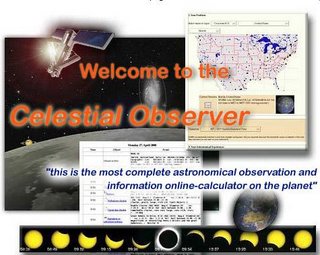
I like to review things here and there that other astronuts like myself might find handy. This review is about the Calsky website.
Calsky is a very useful tool for all levels of astronomers. By creating a free profile, you tell it where you live, what sort of scope you have and what you consider your user level to be. The user levels range from "I don't have a clue about astronomy" to "astronomer". The site is very easy to navigate and is packed full of some pretty good features. HEre's a brief rundown of those features:
1. Star chart access for your exact location (Ok, so nothing new here)
2. Excellent Celestial Calendar: This calendar enables you to generate a list of interesting events for a given timeframe, be it a night, two nights, a week, whatver. The resulting calendar will give you information including meteor showers, iridium flares, planetary phenomenon (a transit of a Jovian moon, for instance), best times to view a comet, and so on. It is all listed chronologically so that you can plan your observing evening.
3. Celestial Calender by Object Type: This is a variation of the above calendar, but with this you can specify certain types of objects. For instance, if you want to spend a night checking out globular clusters exclusively, you can generate an observing list which will let you know the premium time to observe each globular cluster in your list. You can do the same for galaxies, nebulas, open clusters, or a combination of these.
4. Real Time Planetary View: I like this feature! Select a planet, then a specific time and the website will give you a decent life-like image of the planet at the time. This can be useful for determining the phases of Venus, the appearance of Mars or the moon positions of Jupiter and Saturn. Hover your mouse over the various moons or surface details and you are returned with a description of that feature. This is particularly useful in a retroactive sense, too. Let's say you're out looking and Jupiter, and you witness a transit of one its moons. None of your astrobuddies are aware of what it is, so when you get home, log into Calsky, select Jupiter, set the time for when you were observing, and Calsky will return a very close image of what you saw, and which moon was in fact transiting the surface. Lovely!
5. Links to Atmospheric Predictors: You can link to local skyclocks and satellite maps to plan your night out.
6. Satellite Predictor: Calsky will give you access to all manner of satellite passes, ranging from Hubble or ISS to a wee bit of spacecraft debris left over from 1968!!!! It's fun to actually test its accuracy, it's pretty close!
7. It's free, yippee!
Give it a shot - it's good fun and easy to use.
No comments:
Post a Comment